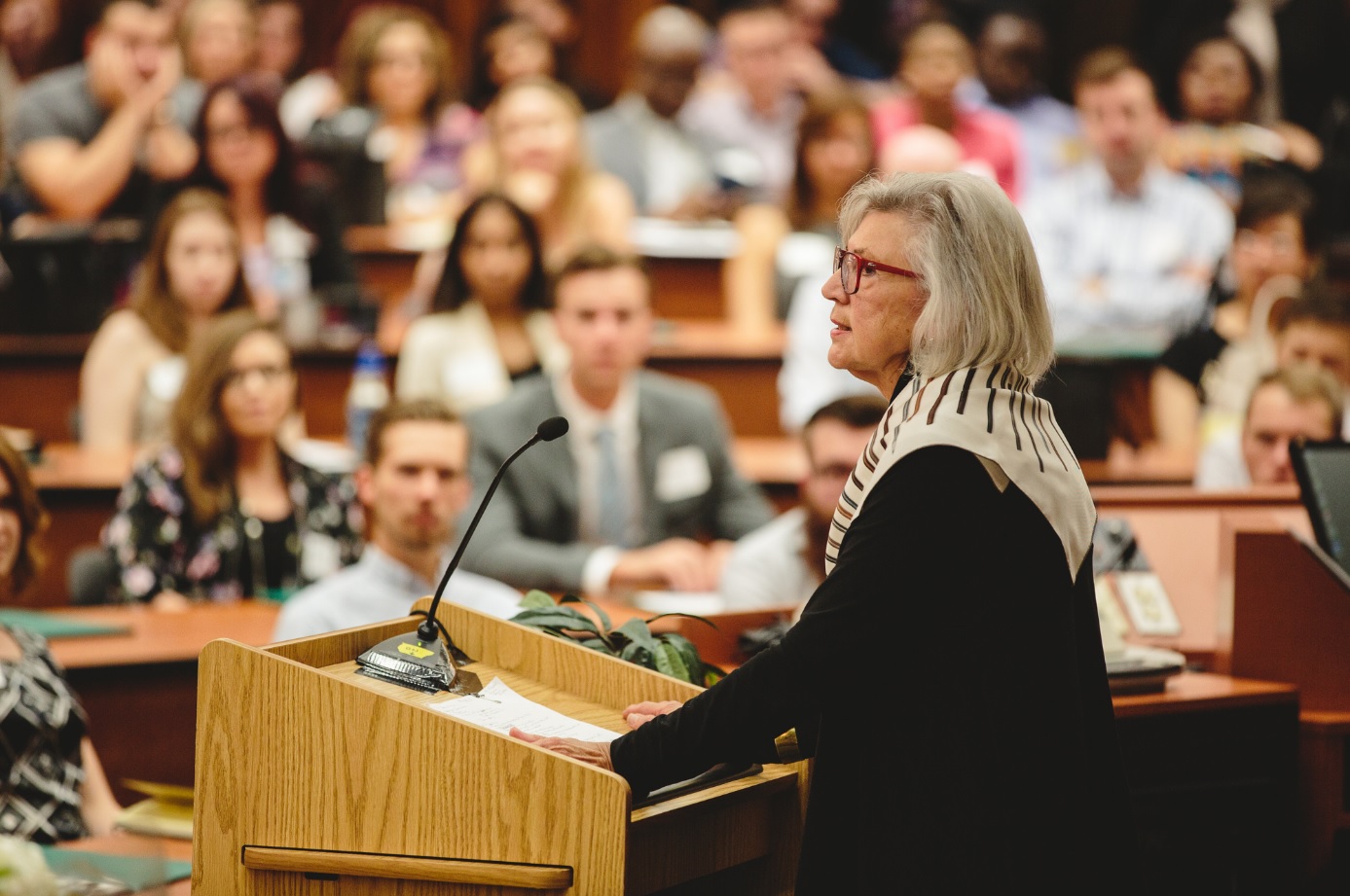
Chief Justice Beverley McLachlin addresses UAlberta Law Class of 2020 at McLennan Ross Hall on September 5, 2017.
There are star alumni - and then there's Chief Justice Beverley McLachlin, arguably the most important jurist in modern Canadian history and a living, breathing argument for getting a law degree.
Chief Justice McLachlin, who in 2000 became the first woman to head Canada's top court, welcomed the JD Class of 2020 on September 5 as part of UAlberta Law's Orientation events. Having announced her retirement in June of this year, her address to UAlberta Law's incoming students will be among her last public functions as presiding chief justice.
"We're thrilled to be starting off our 2017-2018 academic year with a visit from one of Canada's most accomplished jurists and one of our faculty's most illustrious alumni," said UAlberta Law Dean Paul Paton.
"As Canada's first female Chief Justice and the longest-serving head of our country's top court, Chief Justice McLachlin is an inspiration to every one of us at UAlberta Law. Her contributions to constitutional law, human rights and Indigenous law are unparalleled, and her career stands as a testimony to everything we value and promote at the Faculty. We are deeply honoured that she has chosen to address our students in her final year as Chief Justice."
"A Beacon of Legal Rights"
The Right Honourable Beverley McLachlin, P.C. spoke to a packed McLennan Ross Hall in the afternoon of September 5. The Chief Justice was joined by several other speakers, including Law Society of Alberta President Anthony Young, QC, Canadian Bar Association President Jenny McMordie, Alberta Lawyers' Assistance Society Director Judge Robert Philp and Alberta Chief Justice Catherine Fraser.
The Chief Justice began by recounting the massive changes to Canada's judicial system that she has witnessed since she was a law student.
"When I sat where you are today Canadian law was still more a product of British colonial tradition than anything authentically Canadian," she said, noting that until 1949 the Judicial Committee of the Privy Council in London still held ultimate power over Canadian judicial matters.
"During my career I've seen the Supreme Court of Canada transform from a sleepy colonial institution to a vibrant, dynamic presence that now stands as a beacon of legal rights, a court that one leading international law scholar in Denmark held up as one of three "alpha courts" worldwide."
In her characteristically plainspoken fashion, Chief Justice McLachlin urged the students present to take inspiration from Canada's great legal tradition and carry the torch on behalf of generations to come.
"The law has given me, and will give you, the opportunity to be useful, to do something significant with your life. And that is a wonderful thing that will give you satisfaction when you stand where I stand now."
Star Student, Star Jurist
Much about Chief Justice McLachlin's career would be hard to believe were it not so easily verifiable. Born in Pincher Creek, Alberta in 1943, McLachlin completed a degree in philosophy at the University of Alberta before gaining admission to law school on the basis of a letter written to then-Dean Wilbur Fee Bowker - to which he responded with the word's "You're accepted." She proceeded to graduate at the top of her class, and advanced through the legal profession at breakneck speed, achieving her first judgeship in 1980 and appointment to the Supreme Court by Brian Mulroney in 1988.
Appointed Chief Justice by Jean Chrétien in 2000, she quickly went about changing the culture of Canada's highest court, ushering in a new era of legalese-free communication with the Canadian public and an emphasis on consensus-building among justices. She also helped advance many of the era's most consequential legal causes, including same-sex marriage and consultation laws pertaining to indigenous land. She was also never afraid to court controversy or step on politicians' toes, as she famously did in the case of Stephen Harper's thwarted nomination of Marc Nadon to the Supreme Court in 2014.
In addition to all this, McLachlin enjoyed a lesser known stint as a legal educator, having spent seven years as a law professor at the University of British Columbia while serving as a British Columbia judge.
A Well-Deserved Victory Lap
Chief Justice McLachlin announced her retirement in June 2017. Her record-breaking tenure as chief justice will officially end on December 15 of this year, nine months ahead of her mandatory retirement age 75.
Following her address to the UAlberta Law Class of 202 on September 5, she attended an evening event in her honour at the Art Gallery of Alberta. She later addressed the Department of Philosophy in a public event on Wedensday, September 6.